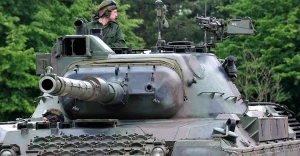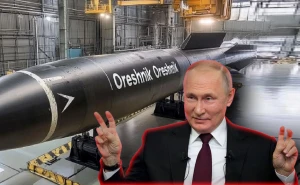
Lest the force take over
For over a year, Russia has been implementing its favorite method of warfare - pushing through despite losses
They are used to not having to count personnel, and they compensate for the lack of modern equipment with the intensity of shelling, the number of shells, UAVs and missiles.
This makes their potential position in negotiations unconstructive - they believe that they will take whatever they want by force, by blunt pressure.
They mistake forms of politeness for weakness and threaten the West with war if it increases its support for Ukraine.
They blackmailed a fifth of the world with hunger until they lost control of the western Black Sea to Ukraine.
They use agents, useful idiots, complicated procedures, and inevitable delays in replacing their presence in markets (especially energy markets) to disrupt, weaken, and slow down sanctions.
This is the most dangerous stage of the war, because, strangely enough, the Russians feel perhaps the most confident. They are acting in their usual way, with their usual tools, and they have an abundance of these tools.
But it is precisely in this nature of the war that Russia's defeat is hidden.
In the memoirs of the Tsushima defeat and the subsequent events that triggered the collapse of the Russian Empire, historians often note the despairing cry repeated by both ordinary sailors and admirals of the destroyed squadron: "The force did not take.”
As if they were faced with an enemy that could not be pushed through, covered with corpses, or thrown with hats.
And to prevent "force from taking over" in the Ukrainian east and south, the Ukrainian Armed Forces must grind them down, preserving Ukrainian lives as much as possible. Then the Russians will form the opinion that it is impossible to fulfill their plans, no matter how much force they use.
To achieve this goal, two conditions must be met.
First, saving the lives of Ukrainian soldiers.
There are three components:
- Fortifications that negate Russia's firepower and provide protection for the defense forces. This means building fortifications as quickly as possible, under close parliamentary and public scrutiny. Space and aerial reconnaissance make hiding fortifications pointless. Instead, demonstrating a strong defense will have a demoralizing effect on the enemy, who is being driven into a meat assault.
- The speed and completeness of supplying the troops with ammunition, protective equipment, and everything they need. The experiment of centralizing the relevant funds has obviously failed. We should return to a model where communities could direct funds to support specific brigades, covering "current" needs. And centralized procurement would take care of standardized items of unified weapons, supplies, protective equipment, etc. Such a division of labor would make the best use of the strength of Ukrainian society - the ability to build flexible horizontal links of mutual support.
- Quality of training. One of the fears that drives many Ukrainians to evade mobilization is that the untrained will be thrown into battle. To overcome this fear, it has long been necessary to explain in detail how soldiers are trained - that it lasts long enough and does not consist of "drill" and cleaning the territory.
As with the fortifications, reasonable openness (without disclosing tactical findings, but with a demonstration of proper and ongoing training) will strengthen the morale of Ukrainians and demotivate Russians.
Of course, the information campaign must be based on effective real-life training. Long, thorough and modern. There is no shortage of methods - the entire experience of humanity's wars, the achievements of all Western schools, based on "initiative and preservation of people," are at our service.
If only there was talent.
The second condition is to encourage partners to provide more assistance to Ukraine and to put more pressure on Russia.
We also need to take into account psychological factors.
Assistance, including high-tech weapons that can achieve greater results with fewer resources, is and will be given more (not less)—not under appealing slogans, but based on the recognition of dealing with a partner and ally—"one of our own."
Western democracies, protected by NATO, do not feel directly threatened by Russia.
It is important for them to understand why they should support Ukraine.
It will help if they feel that they are giving weapons to 'their own,' providing economic assistance to 'their own,' and imposing sanctions against Russia, bearing temporary hardships, for the sake of 'their own'—a democratic, European Ukraine.
Everyone who is not at the front has a duty to work toward this perception of Ukraine in the world. After all, a democratic country united around victory and conscious of its path to the EU and NATO will receive help and assistance until the Russian force is broken.
Therefore, the government's dictatorial schemes and attempts to settle political scores should be abandoned, and the saboteurs who engage in them should be removed from positions where they can do harm, at the very least.
These two conditions for overcoming the Russian "force" should be the basis for assessing all actions of the authorities and applying public pressure on them if they do not fulfill these conditions.
"Servants" and office "managers" are frequent visitors to social media. It is important that they see the requirements for their work there.
About the author. Rostyslav Pavlenko, Ukrainian politician, political scientist, political strategist, teacher. and former lawmaker.
The editors do not always share the opinions expressed by the blog authors.
- News













































